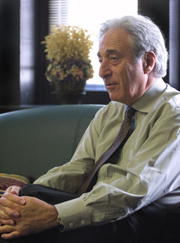
Dr. Frederick Lowy’s
alma mater, McGill, paid tribute to his achievements in bioethics, psychiatry
and academic administration yesterday.
Photo by Andrew Dobrowolskyj
|
by
Barbara Black
Concordia’s Rector and Vice-Chancellor, Frederick Lowy, was given
an honorary degree yesterday afternoon by his alma mater, McGill University.
The degree, which was presented at the convocation for the Faculty of
Medicine, pays tribute to his lifetime achievement in medicine, particularly
bioethics and psychiatry, and to his work as an academic administrator.
Dr. Lowy is part of that remarkable generation that attended Baron Byng
High School in downtown Montreal during the 1940s. He studied medicine
at McGill (1955-59), and first went into general practice for a year,
but psychiatry held a fascination for him.
“I was always interested in people and their mental life,” he
said in an interview. He began his psychiatric career at a time when new
approaches were beginning to challenge the dominant influence of Freudian
psychoanalysis.
Sigmund Freud, who virtually invented modern psychotherapy early in the
20th century, is frequently criticized now, but Dr. Lowy, as a trained
pscyhoanalyst, said that’s like criticizing Isaac Newton for being
behind the times in physics.
“What he did was show that people with severe mental illnesses can
be understood, that we all have an inner life governed by forces that
can become known. In fact, Freud influenced literature and art as much
as medicine.”
Dr. Lowy remembers his earliest years in the field. “I came to the
field at the tail end of Dr. Cameron’s experiments. Even then, for
me, as a young person, they seemed bizarre.”
Ewen Cameron, then head of McGill’s department of psychiatry and
its principal psychiatric facility, the Allan Memorial Institute, came
under heavy criticism decades later for his distressingly callous experimental
therapies, some of which were financed by the U.S. Central Intelligence
Agency. Restitution was eventually made to some of his patients.
Sleep and dreams research
The 1950s was an era of experimentation and progress. Dr. Lowy remembers
how psychiatrists were abandoning the heavy use of electroshock therapy
and such methods as insulin-induced coma, and turning to more effective
scientifically derived treatments.
Psychotropic drugs began to make their appearance. Research began into
patterns of disease that would radically change the way we look at the
mentally ill. “We know so much more today about the genetic basis
of serious mental illness, and the interaction of biological, psychological
and social factors,” Dr. Lowy said.
His own research in those early years focused on sleep and dreams, as
more became known about the phases of sleep through electroencephalograms
and the measurement of rapid-eye movements, or REM. He was psychiatric
consultant at the Royal Victoria Hospital and the Neurological Institute,
in the late 1960s, and started the sleep research lab at the Allan Memorial.
In 1971, he was offered his first administrative post, as chief psychiatrist
at the Ottawa Civic Hospital. As the father of a young family, he judged
Ottawa a good place to settle.
However, in 1973, his young wife died. “It was a bad time,”
he says simply now. Offered the leadership of the Clarke Institute of
Psychiatry, which was already Canada’s largest research facility
in psychiatry, he jumped at a new challenge and “the opportunity
to work with top-notch people.”
That post led to his becoming, in 1980, dean of medicine at the University
of Toronto. Running Canada’s largest medical school was a huge, exciting
responsibility. While he was at the University of Toronto, Dr. Lowy’s
sensitivity to patients, developed through his psychiatric practice, led
to more change.
“I felt that the ethical side of physicians’ training was lacking,”
he said. “On a sabbatical in 1987, I spent a half-year at Georgetown
University, in Washington, D.C., at the most important centre of medical
ethics in the U.S., and when I came back, I established the University
of Toronto Centre for Bio-Ethics.” Since then, he has worked on bioethical
issues, from physician training and values to euthanasia and organ transplantation.
Helping Concordia move forward
Dr. Lowy came to Concordia in 1995, and has enjoyed being Rector enormously.
“There has been tremendous variety and challenge. I arrived at a
time when people wanted to see change, and it has been gratifying to see
Concordia moving forward. This has been a very good time for us.”
Dr. Lowy’s second wife, Dr. Mary Kay O’Neil-Lowy, is a practising
psychoanalyst and teaches in the field.
Does his psychiatric background help him in his administrative work? “Of
course it helps. It has given me a greater appreciation of people and
their needs and motives.”
He does miss treating patients, something he was still able to do as an
administrator in Toronto but had to give up here because of time constraints.
When he came back to Montreal, his alma mater gave him the title of adjunct
professor in the Department of Psychiatry, and occasionally calls on his
expertise.
However, there is no doubt about his primary objective: to help Concordia
move into the first rank of Canadian universities. Congratulations on
your honorary doctorate, Dr. Lowy, from all your friends at Concordia.
|
|
|



